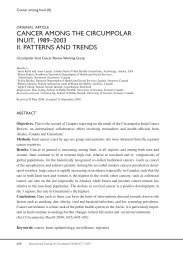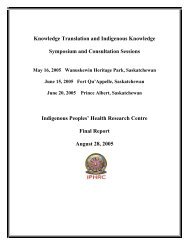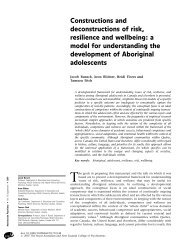EVALUATION OF THE ONTARIO COMMON ASSESSMENT ... - CCIM
EVALUATION OF THE ONTARIO COMMON ASSESSMENT ... - CCIM
EVALUATION OF THE ONTARIO COMMON ASSESSMENT ... - CCIM
Create successful ePaper yourself
Turn your PDF publications into a flip-book with our unique Google optimized e-Paper software.
OCAN Evaluation for Aboriginal Mental Health Programs<br />
Staff generally felt that the evaluation was perhaps scheduled too early to provide definitive feedback on<br />
the fit of OCAN within the daily business of local service system, and more importantly the fit with the culture<br />
and presenting concerns of Aboriginal clients in the James Bay area. One provider even stated “it is too soon<br />
to tell if it is working, come back again next year!”<br />
The research team explored the underlying reasons for this sentiment throughout the two days spent on site.<br />
However one theme emerged almost immediately: While providers were initially interested in OCAN because<br />
it is a standardized tool and used elsewhere in North Eastern Ontario, they also reported that they<br />
increasingly questioned if OCAN information from the James Bay coast clients can be “read” accurately by<br />
service providers elsewhere in the province to reflect the clients story. There were concerns that the OCAN<br />
may not accurately portray the needs of the individual client or client population. Essentially, providers were<br />
questioning the reliability and validity of the tool within the Aboriginal client population of the James Bay<br />
area. We will elaborate more on this sentiment in the following sections.<br />
On a more positive note, providers shared the hope that the OCAN would collect the necessary evidence to<br />
support program development. Staff generally felt that the JBC mental health program is servicing many<br />
clients with extremely high needs and without the necessary range of specialized mental health services and<br />
resources.<br />
Perceived Adequacy of OCAN Staff Training and Support<br />
Staff felt that the OCAN training they received was a good start, however they agreed that it “felt rushed”<br />
and that is was too short. Most importantly the client scenarios used during the training session were not seen<br />
as very helpful since they did not match the reality of the Cree client population on the James Bay coast. For<br />
example, staff therefore felt they were not sufficiently prepared during the training sessions to implement<br />
OCAN in a service environment with clients who are predominantly Cree speakers and culturally quite<br />
different from mainstream Canadians. Only some providers are fluent speakers of Cree and translation is<br />
frequently required to complete the OCAN. Providers experienced that the OCAN was very challenging to<br />
translate into Cree, since many of the concepts were based on Western culture or clinical mental health<br />
concepts that are difficult to translate into Cree. Frequently concepts used in OCAN and OCAN training do<br />
not exist in the Cree culture or language. Furthermore, some areas of the OCAN ask very direct and intrusive<br />
questions of the client, which is incongruent with Cree cultural norms and even violates cultural protocols.<br />
Providers felt that training session should include focused discussions on how to address these specific cultural<br />
issues, so that workers would not have to individually work this out through trial and error.<br />
Providers felt that the OCAN telephone support line was very helpful and allowed for quick access to more<br />
general questions related to OCAN use.<br />
The OCAN portal on the other hand has caused some difficulties. Providers report intermitted problems with<br />
(a) gaining access to the portal, (b) finding information and (c) downloading information.<br />
Current status of OCAN implementation<br />
Staff explained that most clients will see staff sporadically and often only during a crisis and it is therefore<br />
difficult to implement the OCAN with many of their clients. One provider explained: “mental health<br />
management is a very hard concept to get across to most of our clients”, as they are often struggling with<br />
many issues and are unable to focus on managing their mental health. After several attempts with various<br />
Sutherland & Maar - March 2010 Page 23








